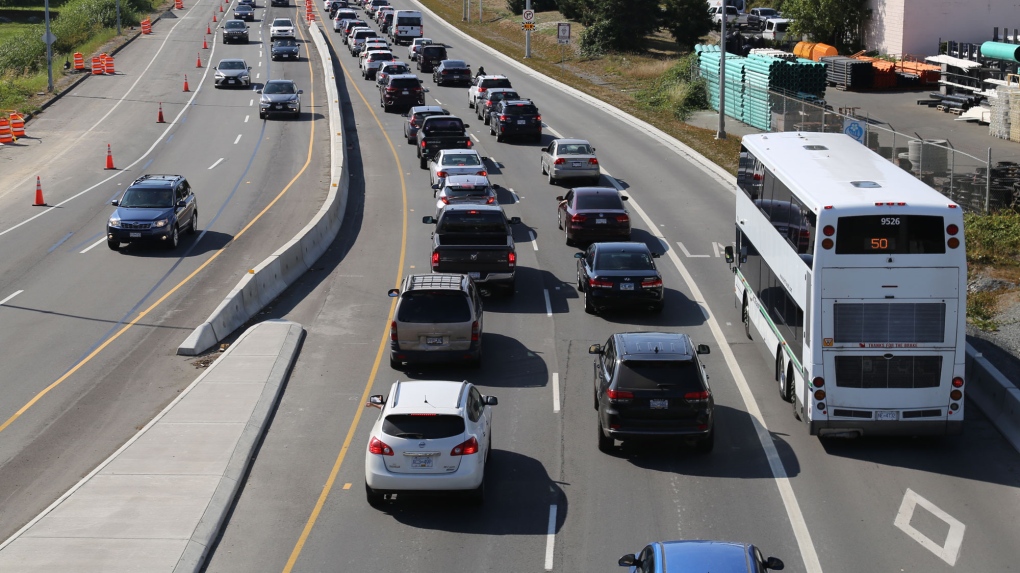On March 20 the UVSS voted to endorse the letter to the B.C government

Photo via BC Transit.
This past February, the B.C. government requested input and consultation from British Columbians on the upcoming Clean Transportation Act regarding transit and greenhouse gas emissions (GHG) in the province. In response, a group of civil society organizations called the BC Climate Emergency Campaign, have rallied to put together recommendations and input in an open letter, urging the government to prove its “commitment to climate emergency action, human health and wellbeing, and equity and affordability.”
Elaborating the CleanBC plan from 2018, the B.C. government released the Clean BC Roadmap to 2030 in October 2021. The plan specifies actions and initiatives that will help reduce GHG emissions by 16 per cent by 2025, 40 per cent by 2030, 60 per cent by 2040, and 80 per cent by 2050. Included in this effort is a commitment to GHG emissions reduction targets in the transportation sector. The transportation sector includes both on-road and off-road vehicles, including transit used in areas such as mining, forestry, construction, domestic aircraft, and domestic rail.
It was under the commitment of the CleanBC Roadmap to 2030 that the government asked for input from the province’s citizens and organizations as they considered the implementation of the Clean Transportation Action Plan (CTAP). According to the B.C. government website, “The purpose of the CTAP is to identify the next set of actions to reduce greenhouse gas emissions in the transportation sector by 27-32% by 2030, and increase economic opportunities in clean transportation in British Columbia.”
The Act will outline five major ways in which the province plans to approach this commitment. The first is through reducing overall distances traveled by light-duty vehicles. The second is shifting to more efficient modes of transportation, such as encouraging shared commuting trips to work and the increase of walking, cycling, and public transit. The third is improving overall vehicle efficiency for personal and commercial transportation. The fourth is adopting zero-emission vehicles, as well as aiming to implement 10 000 public zero-emission vehicle charging stations by 2030. Lastly, the fifth approach includes using cleaner fuels and reducing the use of gasoline and diesel.
The B.C. government website reports that the transportation sector generates the highest amount of GHG in the province. Vehicles like passenger transport (cars, trucks, motorcycles) and freight transport (heavy duty trucks and rail) exhibit the largest emissions within the transportation sector. Ultimately, the request for input on the CTAP acknowledges that producing different behaviour and “market transformation” across all sectors of society is required for making change.
B.C. civil society organizations who are passionate about addressing climate change in the province have taken the request for input as an opportunity to present recommendations and gain endorsements. The BC Climate Emergency Campaign (the Campaign) is a joint collection of civil society organizations who are concerned about the climate emergency, and who are uniting to hold the government accountable for its commitments towards climate policy and action.
The Campaign requested that groups endorse an open letter to be sent to the government outlining six themes to be included in the CTAP. One of the recommendations includes providing inexpensive and available electric public transit “within and between all communities.” Another recommendation includes funding for initiatives such as more protected bike lanes, pedestrian priority spaces, and specific areas for trees to help cool urban sector temperatures.
“We could see a network of electric bus rapid transit lines being built in this region very quickly if the government acts on our recommendations, including along McKenzie to UVic as BC Transit is planning,” said Eric Doherty, a transportation planning consultant and member of Climate Justice Victoria, in an email to the Martlet.
According to the Campaign, more than 50 organizations and stakeholders have endorsed the open letter. This includes initiatives like Climate Justice Victoria, Greater Victoria Climate Reality Project, the BC Climate Alliance, Union of B.C. Indian Chiefs, and Single Mothers’ Alliance. Some UVic groups have also endorsed the open letter. The UVic Undergraduates of Political Science Student Union and the UVic Society of Geography Students are also signatories.
On March 20, the University of Victoria Students’ Society (UVSS) passed a motion to also endorse the Campaign’s recommendations and their open letter at a bi-weekly board meeting. The proposal was brought up by Izzy Adachi, director of campaigns and community relations. The letter was brought to their attention by Climate Justice Victoria. Adachi reflects on how the UVSS has been increasingly advocating for focus around climate and transit issues, citing that these subjects spark questions around equity, especially for people who are disabled, Indigenous communities, families, and students.
“I was super excited to support this collective lobbying effort at the UVSS Board level, as I believe we can accomplish far more together than we can apart,” said Adachi, in an email to the Martlet.
Endorsements for the open letter closed on March 31, and the government’s request for input closed April 5.
“B.C.’s greenhouse gas emissions are not decreasing at the speed the crisis requires,” says the BC Climate Emergency Campaign website. “We share a belief that B.C.’s climate plan, CleanBC, needs a profound jolt, one that would transform CleanBC into a genuine emergency plan and force the provincial government to take real action on climate change.”







